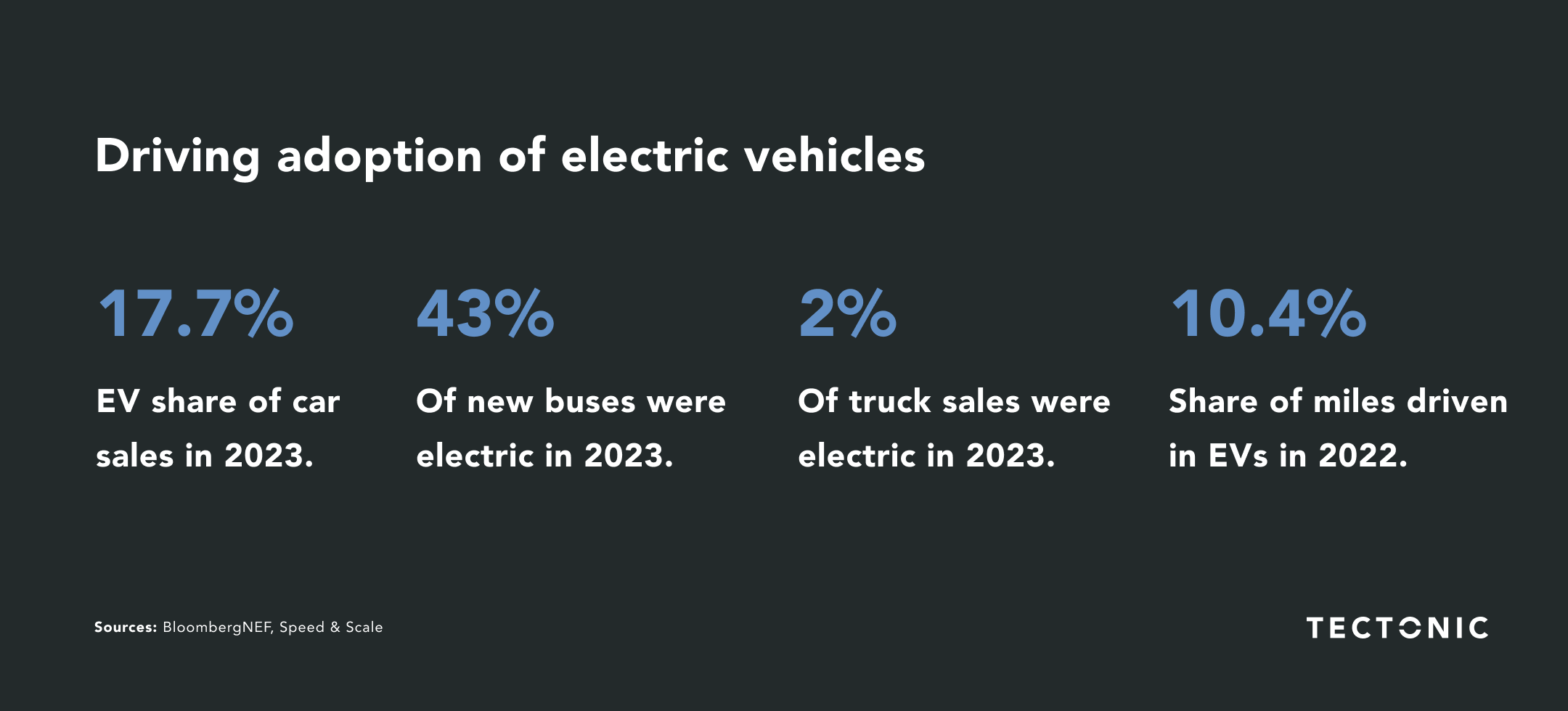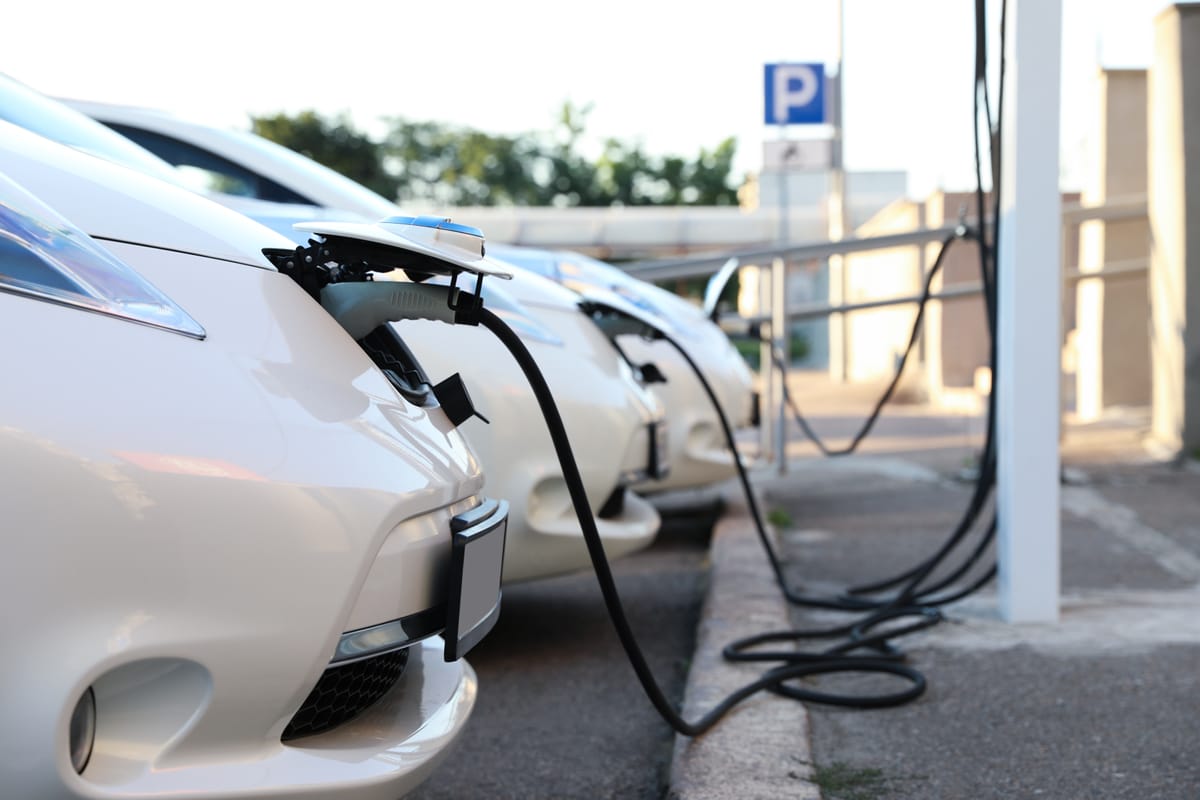This week, we're exploring continued efforts to drive the adoption of electric vehicles, ranging from new universal chargers to financial incentives in Colorado and Norway to nicely designed public buses in London. Even the Pope is going green with a new electric Popemobile from Mercedes-Benz.
Follow Tectonic on Instagram and LinkedIn for regular updates about the innovators and innovations moving climate ambition into action.
Universal plug-and-charge for EVs coming in 2025: A new "Universal Plug and Charge" initiative, set to launch in early 2025, aims to simplify the process of charging electric vehicles at DC fast-charging stations by eliminating the need for multiple payment methods and apps. The initiative, led by SAE International, will enable EVs to communicate with charging stations over a cloud connection, allowing for seamless payment processing and authentication. The Electric Vehicle Public Key Infrastructure (EVPKI) is a key component of the initiative, building on the ISO standard to provide faster and more secure authentication and authorization for EVs at charging stations. Major players, including Tesla, have joined the initiative, allowing EVs to have a plug-and-charge experience at multiple charging stations, not just those affiliated with their manufacturer. The initiative is expected to make charging an EV easier than filling up a gas-powered car, with users simply needing to plug in and let the car and charger handle the payment details.

Norway takes the lead on EVs: Norway is on the cusp of becoming the world's first all-electric vehicle market, with electric vehicles accounting for 94% of new car sales in October, almost double the rate in China. The country's transition to EVs has happened with remarkable speed, despite its cold climate and low population density, which were initially seen as hurdles. Norway's success in promoting EVs can be attributed to targeted incentives, a greater variety of available cars, and successive governments aligned on reducing transport emissions. The country's oil and gas wealth has also played a role in propelling the transition, allowing for investments in EV infrastructure and incentives. As a result of the shift, Tesla has become the top-selling brand in Norway, replacing Toyota and VW, and Chinese manufacturers like Nio Inc. and BYD Co. are expanding their presence in the market. Despite the progress, combustion cars still account for about three out of four cars on the road in Norway, though the country aims to stop adding new combustion engines next year.
Colorado leads the US on EVs: Colorado surpassed California in the third quarter of 2024 to become the state with the highest EV market share. EVs make up 25.3% of news cars sold in the state, and buyers benefit from both a $7,500 federal tax credit, and a 5,000 state tax credit. Nationally, EVs made up about 9% of total car sales in Q3 in the US compared to 25% in the UK last month.
Musk wants to eliminate EV tax credits: Elon Musk expressed desire to eliminate federal tax breaks for electric vehicle buyers during a meeting with lawmakers on Capitol Hill. Musk stated he wants to "get rid of all credits," including the $7,500 tax credit for certain EV purchases, a move he has previously said would help Tesla in competing with its less advanced rivals. Meanwhile, Honda, Ford, and Kia all saw record monthly sales of EVs in October and November, and Hyundai reported sales of electric models were up 92% in November compared to the same period last year.
Popemobile goes green: Pope Francis was gifted an electric G-Class Mercedes-Benz popemobile by Mercedes-Benz, which has been behind the popemobile since 1930. The electric popemobile is part of the company's move towards zero emissions, with the launch of many electric products, including the electric G-Class, this year. In line with Pope Francis's repeated calls to accept the science of climate change and protect the environment, the Vatican plans to convert all of its vehicles to emission-free options by 2030.
London introduces new electric buses: London has introduced new electric buses designed by Irizar e-mobility, a Spain-based company, which have a unique, tram-like appearance with an aerodynamic shape and mostly hidden wheels. The buses feature sliding side doors, big windows for natural light, and wide aisles, creating a sense of space for passengers and making the interior feel lighter and brighter. The interior also includes comfortable seats, a smoother ride, displays showing upcoming stations, mood lighting that changes with the seasons, and USB ports for charging phones. The electric buses are designed for quick charging, with the ability to top off the battery by about 20% in just six minutes using overhead chargers at each end of the 15-mile route. The buses can also charge at night, and the "opportunity charging" feature allows them to stay on the road longer, reducing the need for drivers to return to garages during the day to recharge.
Negotiations fail at fifth meeting on plastics treaty: Diplomats at a United Nations conference in Busan, South Korea failed to agree on the world's first treaty to tackle plastic pollution, with plans to reconvene in future months to try again. The main points of contention among nations included whether the treaty should limit plastic production, with some of the world's largest petroleum producers opposing any measure restricting plastic production. Delegates also disagreed on the need to phase out harmful chemicals used in plastic and who should bear the costs of implementing the treaty.
Qatar announces £1 billion green tech investment with UK: Qatar and the UK have announced a new partnership to invest in climate technologies as part of British Prime Minister Keir Starmer's efforts to stimulate economic growth. As part of the arrangement, Qatar will invest £1 billion ($1.27 billion) in start-ups in both the UK and Qatar, focusing on energy efficiency, carbon management, and green power. The investment is seen as a significant step in the UK's ambition to become a clean energy superpower, according to Prime Minister Keir Starmer, who is prioritizing growth and partnerships with countries to invest in the UK industry. The announcement was made after Prime Minister Starmer hosted the Emir of Qatar in Downing Street as part of a two-day state visit.
Robots improve solar installation: Planted Solar is developing a fleet of robots to improve the construction of solar farms by dispensing steel rods for solar panels with high precision and speed, using artificial intelligence software to work on varied terrain. The robots can reduce construction time by about two-thirds, with Planted Solar expecting to complete a 100-megawatt solar project in four months, compared to the typical one-year manual construction time. The reduction in land usage, combined with saved construction materials and manpower, can lower energy generation costs by as much as 30%, according to Planted Solar. Planted Solar has raised $20 million in Series A funding from investors, including Bill Gates' Breakthrough Energy Ventures and Khosla Ventures.
Google develops AI for weather forecasts: Google's DeepMind division has introduced a new artificial intelligence tool called GenCast, which has achieved unmatched skill and speed in devising 15-day weather forecasts. GenCast outperformed the world's best forecasts, including those from the European Center for Medium-Range Weather Forecasts, in predicting deadly storms and everyday weather, with an accuracy rate of 97.2% in comparative tests. The DeepMind team trained GenCast on a massive archive of weather data curated by the European center, spanning 40 years from 1979 to 2018, and then tested its predictions for 2019's weather. GenCast's forecasts are probabilistic, providing a range of percentages for the likelihood of weather events, such as rain, and are considered more nuanced and sophisticated than deterministic forecasts. The new agent can generate a 15-day forecast in minutes, compared to hours for a supercomputer, making its projections more timely and advantageous in tracking fast-moving storms.
Meta seeks nuclear power: Meta is seeking 1-4 gigawatts of new nuclear energy to power its US data centers and make the energy available in the early 2030s. The company is asking developers to submit proposals for delivering the reactor capacity equivalent to the electricity needs of 750,000 to 3 million typical homes. The company is open to considering both large, conventional reactors and small modular designs, which may be faster and cheaper to deploy but remain untested.
Companies work to recycle solar panels and wind turbines: According to the National Renewable Energy Laboratory, the world will be managing 54 million metric tons of discarded solar panels by 2050 in a best-case scenario and up to 162 million metric tons in a worst-case scenario if panel quality does not improve. Solar panels and wind turbines are designed to be resilient and long-lasting, making them harder to break down and recycle, with wind blades being a particular challenge due to their size and material composition. Companies such as French solar recycling nonprofit Soren and solar panel recycling company ROSI are working to develop effective recycling methods and capture valuable materials from discarded equipment. Recycling solar panels is economically viable due to their use of valuable metals such as silver, copper, and aluminum in each cell. We Recycle Solar Inc. has developed a destruction line in Arizona that shatters non-resellable panels into fragments, which are then sorted, sifted, crumpled, and crushed to extract basic materials, with the company selling up to 22,500 kilograms of aluminum as scrap metal per week. Europe has made it illegal to send solar panels to landfills.
Barbados secures first debt-for-climate-resilience deal: Barbados has successfully completed the world's first debt-for-climate-resilience operation, a groundbreaking transaction that will finance water and sewage projects resilient to climate change. The deal generated US$125 million in fiscal savings, which will be channeled into new resilience investments, and represents an innovative financing model for climate adaptation that avoids increasing the burden of public debt. The operation involved replacing outstanding, expensive debt with more affordable financing, backed by US$300 million in guarantees from the Inter-American Development Bank (IDB) and the European Investment Bank (EIB).
South African court rules against coal: South Africa's High Court ruled against the government's plan to procure 1,500 megawatts of new coal-fired power, citing the potential impact on public health as the reason for the decision. The ruling states that the plans for more electricity from coal violate the constitutional right to health, making the government's decisions "unlawful and invalid." South Africa currently relies on coal for about 80% of its power. The country has some of the world's worst air quality, with pollution from coal causing various health issues, including respiratory illness, strokes, and heart attacks.


